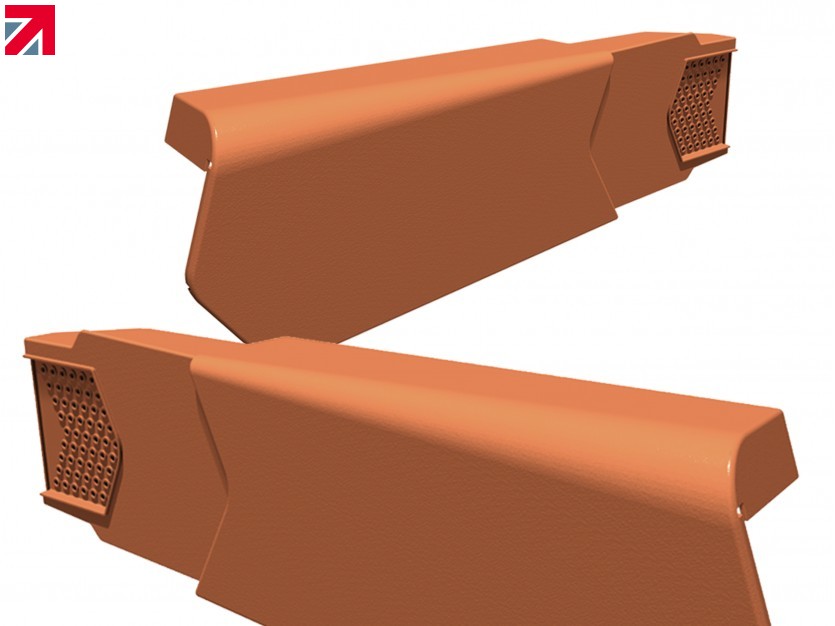The UK roofing market is in constant evolution with industry standards under review and new regulations and guidance being introduced regularly. Traditionally mortar has been used as a bedding material for ridges, hips and verges and its use is carefully prescribed in BS5534, Code of Practice for Slating and Tiling. Whilst providing a familiar method of installing roof components its use does have drawbacks. Achieving an acceptable finish is tricky and time consuming and when used with deep-dished tiles requires the use of dentil slips at the ridge.
Whilst mortar works well in compression its resistance to sheer stresses is weaker and bedded components are therefore more susceptible to damage caused by high winds, made worse by the propensity for mortar to crack during drying and the process of roof settlement.
Dry fix roofing is a cost effective and practical alternative that avoids all the long-term maintenance problems – and costs – associated with mortar bedding. It provides exceptional resistance to water penetration and allows working in all weather conditions, thanks to its mechanical fixing process. The advantage of dry fix is that you can forget about mixing and all the mess, inconvenience and subsequent problems that come with using mortar.
The Building Regulations and British Standards now encourage the use of dry fix roofing. The latest revision of BS 5534 has sought to bring the document up to date with modern building practices. The standard has recognised the need for a change in the reliance of mortar alone to fix roofing elements in place, which had been identified as the single largest cause of roof failures. In particular this applies to the fixing of ridge and hip tiles, which was identified by the N.H.B.C as the number one cause of insurance claims resulting from roof failures. To this end, BS 5534 now states that even if mortar is used, then the ridge and hip tiles must also be mechanically secured to the roof.
The use of fixings in addition to mortar may require an additional batten to fix to, which itself is mechanically fixed to the rafters. This is often difficult to install and still does not remove the risk of subsequent mortar failure resulting in the roof leaking causing damage to the property.
Roof failures can not only be costly, but more importantly can also represent a safety hazard. Indeed, a verge or ridge tile fitted incorrectly or using a poor mortar mix without adequate mechanical fixing could be blown off the roof in cases of strong winds. This is unfortunately not uncommon in the UK.
Nonetheless, it is essential to note that these scenarios can also happen with poor quality dry fix roofing products, hence the importance of choosing high quality systems from recognised manufacturers. BS 5534 stresses that roofers should select dry fix products with great care by comparing the systems’ resistance to wind loads and driving rain, as well as checking their durability performance. Choosing a poor quality system could end up being more costly than making the higher quality choice from the start. In effect, a poor quality system could result in call backs which could require replacement of products and all subsequent repairs. Consequently, failure of ridge, hip and/or verge would be an expense financially and timewise, without forgetting that it could represent a health and safety risk. All of these would also have a damaging effect on the roofer’s reputation and credibility.
Manthorpe manufactures a wide range of dry fix roofing products and systems which are all designed in our UK based, in-house state of the art R&D department and tested to the highest standards.
The products go through high stress in test situations to ensure the best performance and quality. The Manthorpe dry fix range fully complies with the requirements set by the British Standards, proving itself to be of superior quality.
Both the Manthorpe Roll-Out Dry Fix and Dry Verge Systems have been independently wind tunnel tested by the BRE and are certified to resist wind speeds of at least 108mph.
Overall, the simplest and most cost effective way of complying with the new standards is to switch to dry fix roofing and choose quality systems from recognised manufacturers. If you require any technical advice or would like to discuss a specific detail please contact us on 01773 303030 or email mbp.care@manthorpe.co.uk.
Find out more about Manthorpe Building Products on their member profile page here
Member-created content 4 years ago | From members
